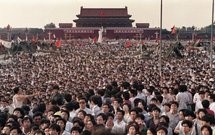 Hundreds of thousands of Chinese held vigils in Hong Kong, Taipei, Washington and elsewhere Tuesday as part of an annual commemoration of the bloody crackdown on China's democracy movement in Tiananmen Square in 1989. In mainland China, sensitive phrasings related to the incident were still censored, political dissidents were kept jailed or placed under enhanced surveillance ahead of the anniversary, and political leaders maintained total silence on the matter. Even so, unofficial commemorations did take place in China.
Hundreds of thousands of Chinese held vigils in Hong Kong, Taipei, Washington and elsewhere Tuesday as part of an annual commemoration of the bloody crackdown on China's democracy movement in Tiananmen Square in 1989. In mainland China, sensitive phrasings related to the incident were still censored, political dissidents were kept jailed or placed under enhanced surveillance ahead of the anniversary, and political leaders maintained total silence on the matter. Even so, unofficial commemorations did take place in China.
It has been 24 years since a dramatic socio-economic transition began in post-Tiananmen China. A fourth generation of leadership since the expulsion of Zhao Ziyang has been launched, with more ambivalent feelings toward the protesters and dead students. Longstanding public demands for the rehabilitation of the Tiananmen protesters have made little progress. Since the 2000s, the official status of the Tiananmen protest has been "political turmoil" rather than the previous "counter-revolutionary rebellion," and a few people associated with the protest, such as Hu Yaobang, the reformist Party secretary whose death catalyzed student protests, have been allowed to resurface in the official media and public discourse. However, most of the victims and those affiliated with the protests have remained in the dark, along with this episode in the Communist Party of China's history.
Millions of young Chinese have come of age since 1989 with little knowledge of the event, thanks to ongoing media censorship and education restrictions. Democratic movements orchestrated from overseas claiming to have inherited the legacy of Tiananmen and seeking to inspire political transition at home have faded over the years due to a lack of coherence and an inability to connect with mainland Chinese. Despite its fading legacy, the Communist Party still finds Tiananmen a difficult issue -- one that challenges its legitimacy and that stands out among the many political upheavals the Party has seen during its more than 60 years in power.
Throughout the devastating Cultural Revolution, the Great Leap Forward, or various class conflicts and power struggles, the Party largely managed to retain its legitimacy through a combination of factional purges or a self-imposed rehabilitation effort. The Party's ability to rehabilitate people originally condemned in those movements and reinterpret those events arose from the fact that while each event represented a serious blow to the Party, the rehabilitations could be justified through a shift in political direction or an ideological re-interpretation within the existing Party-dominated framework. Ultimately, the Party has proved itself adaptable and resilient in the shifting political landscape, staying true to its populist origins.
Unlike previous political movements, however, the student-led democratic protests throughout late 1980s were a result of the fast-paced economic liberalization unleashed by former paramount leader Deng Xiaoping's reforms in the late 1970s. An emerging political awareness followed by demands from below for new political structures and the elimination of single-party rule followed. Grievances ranging from corruption to inequality fueled these demands, which were exacerbated by visible divisions among political elites and ideological debates in academia.
The result was an irreconcilable clash, with calls from the Party for a top-down reformist transformation that collided with popular demands for a more Western-style polity in which the Party would no longer necessarily be the central force. The Party was not ready to accept this. Thus, the crackdown in Tiananmen Square represented the Party's rejection of a grassroots democratic movement. It also meant the end of reforms that had recognized the inevitable need for political modification; the Party was unprepared for more radical demands from below.
The Party attempted to deal with its legitimacy problem in the early 1990s by implementing an unprecedented economic transformation. It had hoped that greater economic wellbeing would mitigate public resistance to its monopoly, resolving the legitimacy crisis that arose with Tiananmen. Today, material benefits no longer satisfy the public. Further, the Party's ability to increase wealth has been degraded by ongoing global economic turmoil.
It was in this context that many expected a Tiananmen rehabilitation as the Party sought to promote, under the new and reformist leadership of Xi Jinping, a long-postponed political agenda halted in the aftermath of Tiananmen. However, such hopes were dampened by an intense intra-Party debate over constitutional reforms reinforcing the Party’s role, at a time when the leadership is focused on managing China's economic transformation.
Eventually rehabilitating those condemned after Tiananmen will not be easy. Political elders involved in the crackdown, or their "princelings," the children of former prominent leaders who occupy high-level political or economic positions, remain opposed to rehabilitation. It will also mean a reinterpretation of the legacy of Deng Xiaoping. Even so, the Party understands it can no longer avoid the subject, just as Deng could not avoid broaching the topic of the Cultural Revolution.
Even minor political reforms can alleviate grassroots grievances, but they can also generate forces spinning outside the Party's control. History may again prove a useful guide. China's last dynasty, the Qing, fell after instituting significant reforms, which were put in place after it first failed to keep pace with grassroots demand. Beijing must manage a delicate balancing act within the Party to facilitate its reform agenda, or it, too, will risk demands from the street for revolutionary change.
Courtesy : Stratfor (www.stratfor.com)